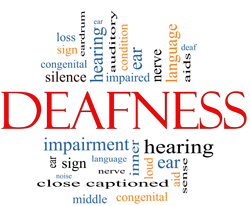Hearing Loss Strategies
The following strategies can help people with a hearing loss manage better.
Lipreading
 We already do it naturally - hearing impaired people are often doing it without noticing. There are many visual cues in a conversation.
We already do it naturally - hearing impaired people are often doing it without noticing. There are many visual cues in a conversation.
The Victorian Health Channel has some information on lipreading
Lipreading takes practise and perseverance. If you are talking to a hearing impaired person be aware that they will follow any conversation better if you are facing them and you speak clearly.
Lipreading is not for profoundly deaf people only - just go into a noisy bar and order a drink will often see the bartender reading your lips - they are probably unnaware of it.
Avoid echoing environments
If you are doing business and are conducting a meeting avoid busy restaurants or rooms with timber floors or echoes. Modern buildings and conference rooms are designed to work well accoustically. Some research before booking a room for a meeting can make life so much easier.
Buy a good sound system
A good sound system will enhance your TV viewing or listening to the radio without the volume needed to be turned up too high.
People suffering a hearing loss often have a problem in certain frequencies - often the high tones. These high tone losses make words and certain voices (children and some females) harder to hear. You will hear part of the word and it is a guessing game after that.
Choose where you sit
Sometimes you cannot avoid being in a noisy environment like a restaurant. Where you sit e.g. which table you book and which seat you sit in can make quite a difference.
It can be hard work maintaining a conversation in a noisy environment. The modern hearing aids work very well in challenging hearing environments. if you are struggling just mention to the others present - I am going to miss some of the conversation - I am finding it hard to hear here.
Get the context of the conversation
It is important that you pick up the context of the conversation at the beginning - so if you are talking to a hearing impaired person make sure they have the gist of the conversation to begin with, it will save you repeating yourself.
What is your communication style?
Passive:
Passive communicators tend to isolate themselves through fear of looking foolish.
It is easier to sit back and occassionally nod rather than actively participate in a conversation.

Aggressive:
You take over the conversation - agressive communicators are the opposite of passive communicators.
They may ignore a speaker in order to force them to repeat.
They percieve any communication difficulties as being the fault of the speaker and not their responsibility as part of a conversation.
Agressive communicators are not always well received.
Assertive:
Assertive Communicators are not afraid to disclose their hearing loss when necessary. They show respect for their communication partners by asking for, rather than demanding, help in the conversation.
They are not afraid to use communication strategies like the ones listed on this page to imrpove thier situation.
